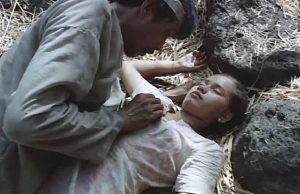Pepsi Paloma’s story is both tragic and, after all these years, still shrouded in suspicion and mystery. Her real name was Belia Smith. She was the daughter of Lydia Duenas, a Filipina from Borac, Northern Samar, and Kenneth Smith, an American postal worker who left when Delia and her three sisters were still young. She blossomed into a beautiful girl, and at the age of thirteen, Delia’s mother brought her to talent scout Tita Ester, who introduced her to talent manager Rey dela Cruz. Dela Cruz changed Delia’s name to Pepsi Paloma, and she became one of his “softdrink beauties” -a trio of bold stars that also included Sarsi Emmanuelle and Cola Nicolas. At the age of thirteen, she was given a starring role in her first bold film, Brown Emmanuelle (1981). Despite her age, she appeared nude on screen and engaged in softcore straight and lesbian sex.
In 1982, she stared in two more bold movies: Krus sa bawat punglo and The Victim. While promoting one of her movies that year, she met actors Vic Sotto, Joey de Leon and comedian Richie D’Horsie. Allegedly the three drugged her in a bar and then gang raped her in a hotel room. Pepsi went to the authorities and the accusations made headlines. If convicted, Sotto, de Leon and D’Horsie would have faced the death penalty. But Senator Tito Sotto, the younger brother of Vic, intervened. He went to see Pepsi and allegedly coerced her into signing an affidavit that dropped the rape complaint. He did this by “placing a pistol on the table in front of her,” according to an Inquirer reporter who investigated what happened.
Pepsi continued her movie career, starring in number of bold movies over the next few years, including Suicide Mama (1983), Naked Island (1984), Matukso kaya ang anghel? (1984), Snake Sisters (1984), and Room 69 (1985).
But her life ended tragically when, at the age of seventeen, she was found dead in her apartment, hanging in her closet with a “three-inch thick and 36-inch long cotton sash” tied around her neck. Police concluded that she committed suicide due to financial problems, citing a diary found in her apartment. Her manager at the time, Babette Corcuerra, disputed the police report, stating that Pepsi “was earning well” and that she was “fully booked for dance performances.” In addition, Pepsi had just concluded performing the “Pepsi Paloma Show” in beerhouses around Metro Manila, and had three pending film offers from various producers. The validity of the diary was never established, and Corcuerra’s implication was that Pepsi was murdered.
Questions remain over Pepsi’s sad death, but one thing is certain: her vibrant life ended much too early.





Pingback:Other Starlets, Stars and Movies – Bold 80s Pinays
Pingback:Sarsi Emmanuelle – Bold 80's Pinays
Pingback:Stella Strada – Bold 80's Pinays
Pingback:Coca Nicolas – Bold 80's Pinays
That’s why the Sotto should never be in politics!
Pepsi Paloma full movie
Pepsi Paloma full movie
Matukso kaya ang angel
I want complete full film movies
I want to resume the legendary film of Pepsi paloma because she is my idol
Pepsi paloma is back from the daed she lives in my memory she is push that makes me move
I believe that when she was about to commit suicide, what she did at that time was because of her personal family problems. If only I could go back in time, I want nothing more than to visit her in her time and save her from her suicide attempt due to sadness and make her feel how beautiful and how good it is to live in the world even if sometimes life is not fair Even though I was still young, born in the 20th century, if she was still alive, she would probably be my grandmother now. Even so, his memories will remain alive in me wherever fate takes me.